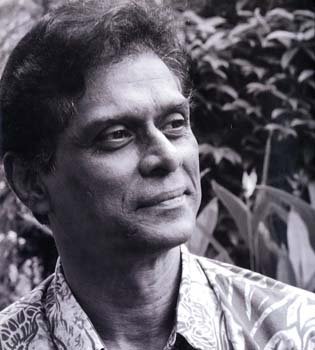
Redza Piyadasa (1939-2007)
Many eons ago at the start of my working life, I was thrust into quite an awkward position. I entered a so called ‘old’ man industry; publishing. My contemporaries were my dad’s age and are his peers. Many an event, awkwardness is the name of the game when there were me and my dad attending the same event. As peer, I would call his friends by name while as a friend of my dad, I should be attach a prefix such as uncle or auntie before their name. There was never a perfect formula I can apply when it comes to this. Therefore, I decided to call his friends that I knew when I was growing up and are my peers by uncle or auntie; even in formal setting while the rest by their name.
One such luminary that I call uncle every time and every where we met was the late Redza Piyadasa. He was an artist, a collector, a gallery owner, a writer, an art critic, a steadfast friend and an art historian. He is a very thoughtful man with very string opinions on many things. It is always interesting to have conversations with him. I have always considered our chats to be a privilege. Many an afternoon went by just sitting in his living room chatting away from one topic to another for he has many interest. Even though he was much, much older than me plus my dad’s friend, he has always had time for me and treated me as a friend. For that, I am truly appreciative, even to this day.
On one such afternoon chat, a gem of a life lesson was imparted to me. I don’t think he ever knew how significant that chat was. He died in hospital and I never managed to say goodbye for the day I visited him was also he day he passed away quietly with my dad besides him reading the Yassin to him. It was the first time that I truly remembered my dad shedding tears.
Uncle Piya (as I call him) said this to me, “Jo, in life we are always defining, be it things, relationships, situation and even people. In the act of defining say someone, we inadvertently define ourself. The very act of defining others, defines us.” I think this came up as we were discussing about art criticism or something similar, in the context of opinions, point-of-view etc.
That statement has stuck with me all these years. I find it intriguing yet I am unable to truly appreciate it because I have not truly delve into it. Only when I started my personal development journey did I the statement unravelled itself.
As an art critic, Uncle Piya is known for his sharp opinion backed by numerous references and examples. He loves doing it and he know very well the perils of this love of his. By nature, opinions are judgements made based on certain criteria and knowledge. These knowledge and criteria is not universally available or agreed upon thus the opinion based on them suffers the same fate. Therefore, in every opinion there will be detractors. Saying all that, does that mean these opinions matter not? Of course they matter because the very nature that the criteria and knowledge they are base upon are not universal, that means they offer a different perspective. Therefore, judgements (this includes opinions, point-of-view, thoughts etc - which are versions of judgements) are a useful tool if used with the best of intentions (again a judgement. Lol). Just as an art critic provides perspective, so does all of our judgements and opinions of anything. Therefore, if it is taken in that context, judgements is in fact quite useful. Neutral is the only context in which it will be useful.
Trouble ensures when we impose our judgement onto others. We make our judgement the only right one; to make other views wrong. And those that we impose this on retaliates by doing exactly what we did. When this happens, we in return intensifies our effort; not willing to be judged as we have done other. This creates another spiral, so on and so forth till something gives. Wars have started because of this.
Therefore, as we judge or give our opinion to others, we better have the maturity to know and accept that we in return will be judged because our action judging other have given permission for others to judge us.
In judging and being judged, we need maturity for it to not have negative consequences.
In addition, it only takes one of the parties concern to make any situation better. Therefore, when someone defines or judge us and we don’t like it, we can always make the situation better by not articulating our judgement of him. Rest assured our so called inaction is not a futile resignation because as Uncle Piya says, the other person has already redefine himself by his action. Job done.
Interesting take on judgement. The truth is by nature of habit, we cannot avoid passing judgment. Unless there are truly no thoughts, which is what the Buddha talks about, but that too is hard to achieve. The only thing we can do is catch ourselves whenever judgement starts forming in our minds, and we immediately wish the person, "May you be well and happy."